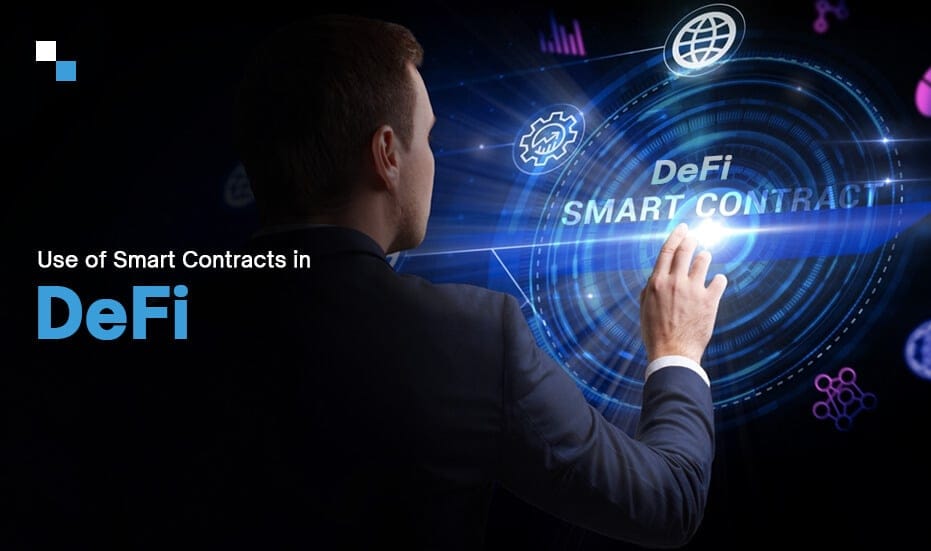Smart contracts are one of the most promising use cases of blockchain technology that changed the face of the industry. These are small pieces of code that automatically and instantly enforce the terms of an agreement as soon as the right conditions are met. Today, smart contracts form the strong foundation of dApps or decentralized applications that attract millions of users to DeFi. At present, there is over USD 84 billion in total value locked up in DeFi smart contracts which is nothing as we are still very early. It is very encouraging to see that DeFi users trust smart contracts and smart contract development services.
The use of smart contracts in DeFi exploded in 2020 and the global Smart Contracts market size is projected to reach US$ 1460.3 million by 2028. While Ethereum still remains the number 1 choice for DeFi app developers, we have seen Binance Smart Chain, Polygon, Solana and Tron smart contract software development also gain a lot of traction.
Why Are Smart Contracts Used in DeFi?
The increased adoption of smart contracts and smart contract development services in DeFi was triggered by increased speed and lower costs of operations.
- Real-time execution
Whether it is Ethereum or Tron smart contract software, the code automates the tasks that are generally accomplished through manual means in traditional finance. Thus, smart contract brings real-time execution to all kinds of business and financial processes.
- Transactional Accuracy
With the automation of transactions, the chances of manual error are reduced.
- Risk elimination
Traditional financial set-ups are prone to the risk of manipulation. However, the use of smart contracts in DeFi almost eliminates any risks related that can be injected into the system due to manipulation.
- Reduced Intermediaries
Smart contracts act as legal contracts between two parties. Thus, the need to depend on intermediaries is almost eliminated from the system.
- Lower cost of operations:
The Smart contract development services design smart contracts in a way that the DeFi apps and processes require minimum manual intervention and intermediaries. This reduces the cost of operations.
Develop your own Smart contact
Schedule Free DemoHow can smart contracts be used in DeFi & other sectors?
Based on the various parameters like sizable market opportunity, participation of well-known investors, technical feasibility like smart contract development services, ease of implementation and corporate adoption, we have identified some of the most compulsive smart contract use cases in DeFi and other sectors.
- Financial services
In financial services, smart contracts can be used for:
a) Trade clearing and settlement:
The Tron smart contract software can manage the workflow between the smart contract counterparties. It can also calculate the trade settlement amounts and as soon as the terms of the contract will be met, the funds will be transferred instantly.
b) Coupon payments:
The smart contract designed to make coupon payments will automatically make periodic payments and as soon as the bond expires the principal will be returned.
c) Insurance claim processing and micro-insurance
Smart contract development services can design smart contracts to perform automated error checking, routing, pay out calculations and pay out processing.
Other areas where smart contracts are used in Decentralized Finance (DeFi) are margin trading, stablecoins, derivatives, lending and borrowing.
- Tokenization of real-world assets
Smart contracts enable the tokenization of real-world assets. The real-world assets are synthesized on a blockchain and the smart contracts enable the trading of these tokens and keep track of the exchange rates of these tokens.
- Betting decentralized Applications
The betting industry has a bad name because the traditional betting industry is prone to heavy manipulation. Tron smart contract software finds a strong use case in decentralized betting applications. Using smart contracts, the apps can automate betting odds, bet settlements, and transactions. Without any intermediaries, these transactions can be completely trusted.
- Gaming Apps
Gaming Apps often use lucky draws or lucky drops. To enable this, smart contracts enable Verifiable Random Functions. These enable trustless lucky draws.
- Prediction Markets
Tron smart contract software and data oracles can work together to relay real-time information to the prediction market apps. This real-time data could be crypto market movement, sports results, or more.
Wrapping it up Overall
Smart contracts have changed the way organizations and individuals exchange information, and have opened newer and easier avenues of financial services and more. Soon we will see more smart contract penetration in our daily use apps.
If you have a groundbreaking idea and are seeking smart contract development services, connect with our blockchain development experts right now.







